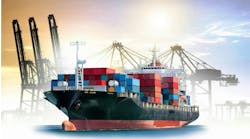Its kickoff was fairly uneventful, but 2020 has since become anything but a “normal” year for individuals and businesses worldwide. Coming off a year marked by trade wars, tariffs and component shortages, few could have predicted the significant, lasting impacts that COVID would have on the world’s supply chains.
For SourceESB’s 2020 Distribution Survey—which was distributed online from March 16 to April 28 and yielded 650 responses from engineering, procurement and executive management professionals—respondents gave feedback on their 2020 procurement priorities, digital technologies, procurement risks, technology investments and use of distributors.
The Big Issues
Here are some of the biggest issues that are keeping these professionals up right now:
Counterfeit parts. When asked to identify potential risks that will impact procurement in 2020, respondents indicated they were most worried about counterfeit parts in their supply chains. Eighty-eight percent said that counterfeit parts are an important risk that need to be addressed, with 32% seeing this as a critically important issue. Only 12% said counterfeit parts were not very important or not at all important.
Network and digital security. Next on the list was network and digital security. As more supply chains become automated or utilize the cloud, the more prone they are to hackers and cyberattacks. Eighty-four percent of professionals indicated that network and digital security was at least moderately important if not more, and 21% said that this risk was critical. Just 16% said it was not very important or not at all important.
End of life/part obsolescence management. Respondents are also worried about EOL and part obsolescence management. Eighty-two percent of respondents believe this area is at least moderately important, with 21% calling it critically important. Eighteen percent of respondents don’t see EOL and part obsolescence as an issue.
Import/export compliance. This is among one the top concerns, with 76% of professionals calling it at least moderately important, and 21% seeing it as a critical issue.
Other risks that respondents are watching and reacting to right now include environmental compliance, conflict mineral compliance, China’s investment in semiconductors design and production, and M&A activity threatening supply options and sourcing.
Technology’s Role in 2020
When asked about which technologies they are currently using or plan to use in the future, cloud-based services and 3D printing stood out above the rest. Thirty-four percent said they already use cloud-based services, and 10% plan to implement them in the next two years. Currently, 31% use 3D printing, and 13% plan to implement this technology in the next two years.
Nineteen percent of respondents are using artificial intelligence (AI) and predictive analytics to support their procurement and supply chain operations, and another 14% plan to implement this technology in the next two years. Another 19% currently use data analytic services, and 12% plan to use these services in the next two years. Blockchain is of lesser priority right now, with just 5% of professionals currently using this technology, and only 4% planning to implement it in the next two years.
When asked about the disruptive impact of these emerging technologies, 23% said that 3D printing would have a significant impact. Twenty-two percent believe that AI and predictive analytics will have a significant impact, while 16% see IoT technologies as the biggest potential disruptor.










